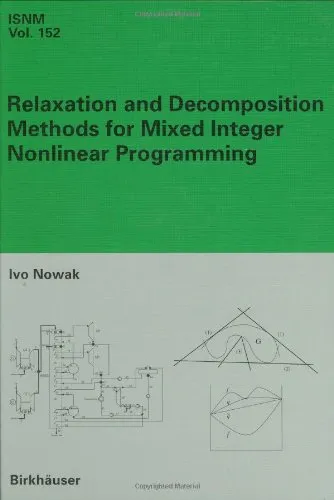Relaxation and Decomposition Methods for Mixed Integer Nonlinear Programming
4.0
Reviews from our users

You Can Ask your questions from this book's AI after Login
Each download or ask from book AI costs 2 points. To earn more free points, please visit the Points Guide Page and complete some valuable actions.Introduction to Relaxation and Decomposition Methods for Mixed Integer Nonlinear Programming
In the realm of optimization, few challenges are as complex and demanding as solving mixed integer nonlinear programming (MINLP) problems. These problems appear across a wide range of industries, from logistics and finance to energy systems and healthcare, demanding sophisticated methods to find efficient and practical solutions. "Relaxation and Decomposition Methods for Mixed Integer Nonlinear Programming" serves as a comprehensive guide to advanced mathematical techniques, offering readers an essential resource to tackle these intricate problems.
In this book, I uncover the mathematical frameworks, algorithms, and computational strategies critical for addressing MINLP problems. Drawing from years of research, the text delves into the theoretical underpinnings of these methods as well as their practical implementation. Whether you are a student, researcher, or practitioner in the fields of applied mathematics, computer science, or engineering, this book provides valuable insights and tools to solve real-world optimization problems.
Detailed Summary of the Book
The book begins with an overview of MINLP, defining the problems, their challenges, and applications in various fields. It sets the stage for understanding the need for relaxation and decomposition methods to overcome computational difficulties associated with nonlinear functions, integer variables, and constraints.
The first section comprehensively explores relaxation techniques, particularly those derived from linear and convex approximations. These techniques simplify MINLP problems by "relaxing" certain constraints or variables, enabling the use of efficient solution algorithms. I dedicate significant attention to linear relaxations, Lagrangian relaxation, and convexification methods.
The second section focuses on decomposition methods, which tackle the problem by breaking it into smaller, more manageable subproblems. Techniques like Benders decomposition, Dantzig-Wolfe decomposition, and branch-and-bound are presented with a blend of theoretical insights and practical examples. Emphasis is placed on how decomposition facilitates parallel computing and iterative solution improvement.
Further, the book discusses hybrid approaches combining relaxation and decomposition, showcasing their efficacy on real-world case studies. Algorithms are accompanied by pseudo-code for clarity, while numerical examples illustrate how these strategies perform in practice. Lastly, the book covers the integration of modern software tools and computational platforms for solving MINLP problems efficiently.
Key Takeaways
- A thorough understanding of MINLP: Gain a clear grasp of mixed integer nonlinear programming and its role in optimization.
- In-depth knowledge of relaxation techniques: Learn linear relaxation, convexification methods, and their underlying principles.
- Mastery of decomposition methods: Understand how to split complex problems into subproblems and solve them iteratively.
- Hands-on algorithms: Access detailed pseudocode, numerical examples, and computational frameworks.
- Practical insights: Explore real-life applications in logistics, energy systems, and beyond.
Famous Quotes from the Book
"Optimization is not merely mathematics—it's a bridge between theoretical models and real-world decision-making."
"Decomposition is nature’s way of handling complexity; we merely imitate it in mathematical form."
Why This Book Matters
Mixed integer nonlinear programming lies at the intersection of theory and practice. Its applications influence some of the most complex and crucial decisions in modern industries. Despite its importance, MINLP is often perceived as insurmountably difficult, owing to its inherent nonlinearity and combinatorial structures. This book demystifies the subject, showing that with efficient methodologies, even the most challenging problems can be tackled systematically.
By focusing on relaxation and decomposition methods, I aim to provide the tools and confidence to researchers, students, and professionals alike. The book not only equips readers with strategies but fosters an understanding of the underlying mathematical principles, paving the way for innovation in optimization research. It is a vital resource for anyone seeking to master optimization techniques and solve complex problems in an efficient, scalable way.
Free Direct Download
You Can Download this book after Login
Accessing books through legal platforms and public libraries not only supports the rights of authors and publishers but also contributes to the sustainability of reading culture. Before downloading, please take a moment to consider these options.
Find this book on other platforms:
WorldCat helps you find books in libraries worldwide.
See ratings, reviews, and discussions on Goodreads.
Find and buy rare or used books on AbeBooks.


